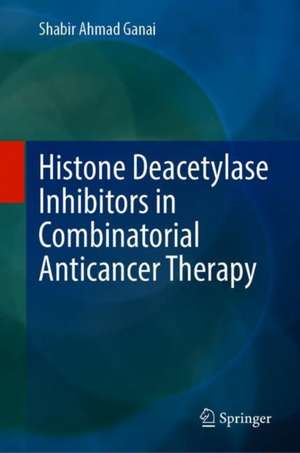Histone Deacetylase Inhibitors in Combinatorial Anticancer Therapy
Autor Shabir Ahmad Ganaien Limba Engleză Hardback – 24 noi 2020
The book begins with an overview of various epigenetic modifying enzymes that are involved in cancer transition and progression; before exploring the potential of HDACs in cancer treatment. It provides a classification of HDAC inhibitors based on their structural attributes, and addresses HDAC-induced cytotoxicity..
Lastly, it discusses and assesses the rationale behind therapies that combine HDAC inhibitors with other anticancer agents to treat solid tumors. Given its scope, it offers a valuable resource for all researchers, clinicians, and students working in formulation, drug discovery, oncology, and personalized medicine.
| Toate formatele și edițiile | Preț | Express |
|---|---|---|
| Paperback (1) | 1093.35 lei 6-8 săpt. | |
| Springer Nature Singapore – 24 noi 2021 | 1093.35 lei 6-8 săpt. | |
| Hardback (1) | 1100.30 lei 6-8 săpt. | |
| Springer Nature Singapore – 24 noi 2020 | 1100.30 lei 6-8 săpt. |
Preț: 1100.30 lei
Preț vechi: 1158.20 lei
-5% Nou
Puncte Express: 1650
Preț estimativ în valută:
210.55€ • 225.14$ • 175.55£
210.55€ • 225.14$ • 175.55£
Carte tipărită la comandă
Livrare economică 17 aprilie-01 mai
Preluare comenzi: 021 569.72.76
Specificații
ISBN-13: 9789811581786
ISBN-10: 9811581789
Ilustrații: XVII, 258 p. 27 illus., 13 illus. in color.
Dimensiuni: 155 x 235 mm
Greutate: 0.57 kg
Ediția:1st ed. 2020
Editura: Springer Nature Singapore
Colecția Springer
Locul publicării:Singapore, Singapore
ISBN-10: 9811581789
Ilustrații: XVII, 258 p. 27 illus., 13 illus. in color.
Dimensiuni: 155 x 235 mm
Greutate: 0.57 kg
Ediția:1st ed. 2020
Editura: Springer Nature Singapore
Colecția Springer
Locul publicării:Singapore, Singapore
Cuprins
Chapter 1_Epigenetic modifying enzymes. -Chapter 2_Epigenetic modifying enzymes implicated in cancer. -Chapter 3_Classification of histone deacetylases (HDACs). -Chapter 4_Implications of 18 HDAC isoforms in therapeutically monotonous cancers. –Chapter 5_Possible Mechanisms of HDACs in Cancer development.- Chapter 6_Different strategies employed for circumventing cancer resistance (chemo and radio) and mitigating toxicity. -Chapter 7_Limitations of conventional therapeutic regimens in treating cancer. -Chapter 8_Overview of epidrugs with special emphasis on HDAC inhibitors (HDACi).- Chapter 9_HDAC inhibitors as promising epidrugs for treating cancer. -Chapter 10_ HDAC inhibitors in anticancer monotherapy. -Chapter 11_Distinct groups of histone deacetylase inhibitors (HDACi) based on the structural distinction, HDACs targeted. -Chapter 12_Limited efficacy of HDAC inhibitor-based monotherapy. -Chapter 13_Resistance mechanisms generated by cancer cells against HDACi based monotherapy. -Chapter 14_ Toxicity issue of HDAC inhibitor based monotherapy. -Chapter 15_Combinatorial therapeutic strategies of HDACi. -Chapter 16_Designing Selective HDACi using computational and medicinal chemistry approach. -Chapter 17. Current therapeutic challenges and future directions.
Notă biografică
Dr. Shabir Ahmad Ganai has formerly worked as Principal Investigator/Young Scientist in the University of Kashmir. He has over 9 years of working experience in the field of histone deacetylases and histone deacetylase inhibitors. He has published more than 24 articles in highly reputed international journals, 3 international book chapters and has authored a book. He is currently serving as a referee for various international journals like Scientific Reports, PLOS ONE, Medicinal Chemistry Research, Current Drug Targets, Current Topics in Medicinal Chemistry, and Journal of Agricultural and Food Chemistry (American Chemical Society Publications). He is a member of two international societies, including the Epigenetics Society.
Textul de pe ultima copertă
This book reviews the latest developments in the design, synthesis, and molecular mechanism of action of Histone Deacetylase (HDAC) inhibitors in the context of potential cancer therapy. HDAC inhibitors are emerging as promising anticancer drug molecules that promote growth arrest, differentiation and apoptosis of cancer cells with tumor selective toxicity.
The book begins with an overview of various epigenetic modifying enzymes that are involved in cancer transition and progression; before exploring the potential of HDACs in cancer treatment. It provides a classification of HDAC inhibitors based on their structural attributes, and addresses HDAC-induced cytotoxicity..
Lastly, it discusses and assesses the rationale behind therapies that combine HDAC inhibitors with other anticancer agents to treat solid tumors. Given its scope, it offers a valuable resource for all researchers, clinicians, and students working in formulation, drug discovery, oncology, and personalized medicine.
The book begins with an overview of various epigenetic modifying enzymes that are involved in cancer transition and progression; before exploring the potential of HDACs in cancer treatment. It provides a classification of HDAC inhibitors based on their structural attributes, and addresses HDAC-induced cytotoxicity..
Lastly, it discusses and assesses the rationale behind therapies that combine HDAC inhibitors with other anticancer agents to treat solid tumors. Given its scope, it offers a valuable resource for all researchers, clinicians, and students working in formulation, drug discovery, oncology, and personalized medicine.
Caracteristici
Provides an overview of epigenetic modifying enzymes that are involved in cancer Explores the potential of Histone Deacetylase (HDAC) inhibitors as promising drugs for cancer treatment Structurally classifies HDAC inhibitors and evaluates HDAC inhibitor-induced toxicity Highlights therapies that combine HDAC inhibitors with other anticancer agents
